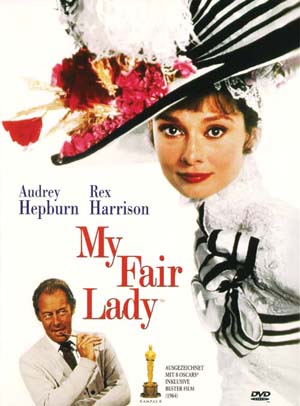
By Song Hye-won
The movie My Fair Lady is based on a play by George Bernard Shaw entitled Pygmalion. Pygmalion is a figure from a Greek mytholgy who succeeded in turning a statue he made into a human being. His story arouses a hopeful message by showing that self prophecy really works. The heroine of My Fair Lady, Eliza Doolittle played by Audrey Hepburn, rises from the gutter to a princess with the effort to change her speech. As her successful transformation attests, it seems that the tale of Pygmalion seems to be underlying throughout the movie. With self prophecy, it is possible to change our speech, and new speech can create a new person in the end.
My Fair Lady begins in the streets of London, where Eliza Doolittle sells bouquets of violets and confronts Henry Higgins, a phonetics and linguistics expert. Higgins accuses Eliza? speech of being a disgusting and depressing noise. He continues to criticize her by saying, ?emember that you are a human being with a soul and the divine gift of our articulate speech. Your native language is a language of Shakespeare, Milton, and the Bible.?When Eliza comes to Higgins?house and asks him to teach her how to speak like a lady, Higgins and his colleague, Colonel Pickering, make a bet as to whether or not it is possible to turn her into someone who would fit in the upper-class English society within six months. Eliza goes through a difficult training process including pronouncing words with marbles in her mouth. In the end, all the efforts pay off when Eliza arrives at the Embassy Hall as an enchanting young lady, charming everyone with her beauty and articulation.
Professor Park Chan-kil (English Lang. & Lit.) says the theme of My Fair Lady is about how region, class, and education determine the way a person talks. In the film, Higgins guesses right about people? life history by observing their linguistic qualities. According to Professor Park, England is a place where the relation between speech and social status is tied more closely together than any other country.
However, this does not seem to be relevant only to England; there was also social stereotypes based on speech in Korea back in the 1970s. According to Professor Park, when Korea was under Park Chung-hee? regime, the former president spoke in a Gyeongsang-do accent. Thus, the Gyeongsang-do accent was considered standard while a Jeolla-do accent was looked down upon. This social hegemony was reflected in the characters shown in media. If a main male character spoke the Gyeongsang-do accent, a maid often spoke the Jeolla-do accent.
Besides its social linguistic meaning, Professor Park says Eliza? case shows that changing one? speech can also change what is within oneself. In the movie, Eliza practices speaking like a lady, and she becomes a real lady in the end. He says that since language is a representation of human nature, language reflects thoughts which distinguishes humans from other living things.
Even though the majority of the story is centered on the romance between Eliza and Higgins, Pygmalion seems to inspire us to look at the daily speaking habit we often miss. Higgins?line on the importance of speaking properly is not the least, but rather a major theme of the movie: ?hat could possibly matter more than to take a human being and change her into a different human by creating a new speech for her? It is filling in the deepest gap that separates class and class and soul from soul.?

